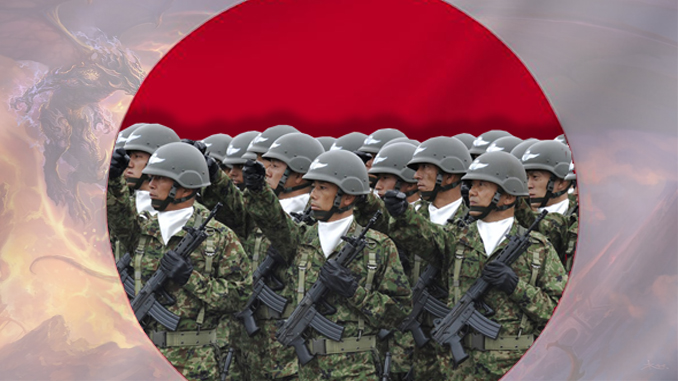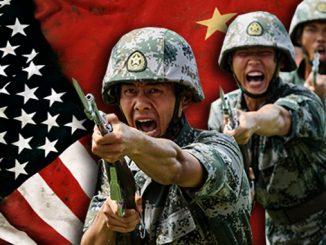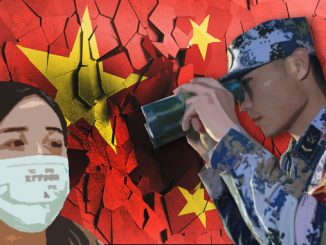
Japan, Hong Kong, and Taiwan fear a new era of Chinese aggression.
By Richard Walker
Japan is now the world’s fourth most powerful military, due in part to President Donald Trump’s insistence when he took office that countries that previously relied on the U.S. to shoulder their defense costs had to begin paying their way.
It did not mean that if Japan were to be attacked that it could not rely on U.S. support. Instead, it was a signal from Trump of a U.S. policy change that was privately welcomed in Tokyo because it provided impetus for the country’s leaders to argue that, as tensions with China increased in the East China Sea and across the Pacific, Japan had to play a greater role in defending itself. Japan had, however, been gradually rebuilding its military without much fanfare. Therefore, Trump’s intervention sped up the process.
Seventy-five years from the end of World War II when Japan was disarmed and told it could not rebuild its armed forces beyond a limited self-defense status, the country’s army, navy, and air force are now among the world’s most technically sophisticated, even more so than Israel. That was always going to be a certainty when you consider how much of a role Japan plays in technological innovation through companies that supply chips for some of the world’s most advanced weapons and machines.
Japan also possesses the skills and the means to become a nuclear country if it so decided. We do not know how Washington, and in particular Beijing, would respond to such a prospect, and Japan is nervous about even mentioning it. Nevertheless, Japan is worried about China’s nuclear weapons and its extensive arsenal of missiles that Japan lacks. Nuclear weapons aside, it is not unreasonable to conclude that Japan will soon begin developing missiles to match China’s. That prospect may have been given a jolt by China’s missile test in the South China Sea on July 2.
China disputes Japan’s claim to the Senkaku island chain in the East China Sea, and its air force has aggressively buzzed Japan’s coastline and its naval vessels. But this is not the only reason Japan is quickly rebuilding its military capabilities. It has been monitoring China’s militarization of the East and South China Seas, as has America and its allies in the Pacific. For Japan, however, there is a significant reason for military expansion. It believes that Xi Jinping, the Chinese leader, has a long-term plan to force the U.S. military out of the Pacific, a scenario in which Japan would be left exposed.
It is not a fanciful fear. Xi has broken every promise he has made to Washington about not militarizing the seas of the region and has consistently made it clear that he is prepared to challenge the U.S. presence. The Japanese are quick to point to comments made in 2018 by Adm. Gary Roughead (Ret.), who presided over a defense review for the Trump administration about the threat Xi Jinping poses. Roughead warned that America could lose a war in the Pacific. That is a scary prospect for Japan, knowing that at any time China might invade Taiwan, believing Washington will not come to its aid.
Meanwhile, Japan is also watching the events unfolding in the former British colony of Hong Kong, an island off China’s coast, where massive protests have taken place over mainland China’s interference in the Hong Kong legal system. Experts suspect that it is only a matter of time before Beijing moves its military onto the island to seize total control of it.
Hong Kong was a British colony for more than a century, but it was handed back to China when the British lease on the island expired in 1998. The hand-back was negotiated on the principle that it would be one country, China, but two political entities, thereby granting Hongkongers freedoms not enjoyed on the mainland. But China has been meddling a lot in the island’s politics. U.S. mainstream media coverage of the protests ignores the fact that the vast majority of Hongkongers do not regard themselves as Chinese, including a mere 3% of young people. They have been protesting regularly because they are limited in how they can influence decision-makers in Beijing. For example, Hong Kong’s leader is chosen by an assembly made up of pro-Beijing figures chosen by a very small percentage of the island’s electorate. It is China’s way of controlling the Hong Kong legislature.
While Japan watches events in Hong Kong, people on the island of Taiwan have a genuine reason to be worried. China also claims Taiwan as its own. The Taiwanese know that if they agreed to a Beijing proposal of a Hong Kong-type model of one country, two entities, they would suffer the fate of Hong-kongers. China, however, may have plans to seize Taiwan, and that possibility frightens Japan. If the Chinese military controlled Taiwan, it would have the window it has always wanted into the Pacific, allowing it to limit all U.S. naval activity in the region.
Richard Walker is the pen name of a former N.Y. news producer.





Japan, South Korea, and Taiwan should go nuclear and declare that an attack by China or North Korea on any of them would be regarded as an attack upon all of them by China.
It appears China wants to ‘force the U.S. military out of the Pacific, a scenario in which Japan would be left exposed.’ Certainly events seem to moving in that direction. The quandary for Washington is: if it stays out of the regional disputes, Japan will have to develop its own nuclear umbrella, taking on the role of ‘protector’. A war between Japan and China could go nuclear. It is the interconnectedness of local disputes that mushroom into global ones. Unfortunately – unless a solution can be found – the pattern of history points to another world war, this time nuclear.
https://www.ghostsofhistory.wordpress.com/
China did not fare well last time they had a tussle with The Island. That said, civilizations are having cultural problems that would affect maintaining a conflict that would last more than a year or so. Additionally Japan denies itself utilization of nuclear technology applied to warfare that would be essential in giving pause to it’s adversary to willy-nilly destroy it’s cities.